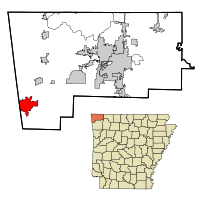Arkansas Town Targeted by Cox Prior to Community Broadband Referendum
Siloam Springs, sporting 15,000 people in the northwestern corner of Arkansas, could be the next community to build its own community fiber network. But first they have to pass a referendum in May in the face of stiff opposition from Cox Cable, which would prefer not to face real competition.
For over 100 years, the city has provided its own electricity via its electrical department. Now, it wants to join the more than 150 other communities that have done so. After last year's changes to Arkansas law, Siloam Springs has the authority to move forward if it so chooses.
Pamela Hill at the City Wire has covered the situation with a series of stories, starting with an explanation of why they are moving forward:

David Cameron, city administrator, said the proposal is not so much about dissatisfaction with current providers as it is about finding new revenue for the city. Cameron said revenue from electric services has been a key source of funding for various projects and necessities for the city. That “enterprise” fund is getting smaller, Cameron said, and an alternative funding source is needed. “We have done a good job managing accounts, building a reserve,” Cameron said. “We want to keep building on the programs we have. It takes money and funds to do that.” City officials discussed the issue for the last 18 months and decided to put it to a referendum. Voters will decide the issue May 22.That is a fairly unique reason. Most communities want to build these networks to encourage economic development and other indirect benefits to the community. Given the challenge of building and operating networks, few set a primary goal of boosting city revenue.

If approved by voters, the city plans to spend $8.3 million to install 100 miles of fiber optic cable directly to homes and businesses. The city should be able to repay the debt in 12 years, if things go according to a feasibility study presented to the city’s board of directors in January.



